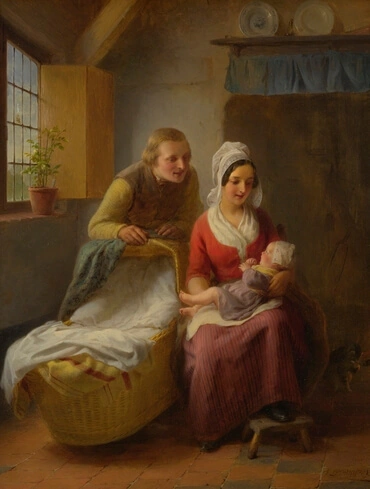1
Pärast seda sündmust öeldi Joosepile: 'Vaata, su isa on haige!' Siis ta võttis oma kaks poega enesega, Manasse ja Efraimi.
2
Ja Jaakobile anti teada ning öeldi: 'Näe, su poeg Joosep tuleb sinu juurde!' Iisrael võttis siis jõu kokku ning tõusis voodis istukile.
3
Ja Jaakob ütles Joosepile: 'Kõigeväeline Jumal ilmutas ennast mulle Luusis Kaananimaal, ja õnnistas mind
4
ning ütles mulle: Vaata, ma teen sind viljakaks ja paljuks ja teen sinust rahvaste hulga ja annan selle maa sinu soole pärast sind igaveseks omandiks.
5
Ja nüüd olgu su kaks poega, kes sulle Egiptusemaal on sündinud, enne kui ma tulin sinu juurde Egiptusesse, minu omad: Efraim ja Manasse olgu minu omad nagu Ruuben ja Siimeongi.
6
Aga su järeltulijad, kes sulle pärast neid sünnivad, olgu sinu päralt ja neid nimetatagu nende vendade nime järgi nende pärisosades.
7
Kui ma Mesopotaamiast tulin, suri mul Raahel Kaananimaal, tee peal, kui veel tükk maad oli minna Efratasse. Ja ma matsin tema Efrata tee äärde, see on Petlemma.'
8
Kui Iisrael nägi Joosepi poegi, siis ta küsis: 'Kes need on?'
9
Ja Joosep vastas oma isale: 'Need on mu pojad, keda Jumal mulle siin on andnud!' Siis ta ütles: 'Too nad minu juurde, et ma neid õnnistaksin!'
10
Aga Iisraeli silmad olid vanadusest tuhmid ja ta ei näinud enam. Siis Joosep viis nad tema juurde ja tema andis neile suud ning süleles neid.
11
Ja Iisrael ütles Joosepile: 'Ei oleks uskunud, et saan näha su nägu, aga vaata, Jumal on mind lasknud näha ka su järglasi.'
12
Siis Joosep võttis nad ära tema põlvilt ja kummardas silmili maha.
13
Ja Joosep võttis nad mõlemad, Efraimi oma paremale käele, Iisraelist vasakule poole, ja Manasse oma vasakule käele, Iisraelist paremale poole, ja viis nad tema juurde.
14
Aga Iisrael sirutas oma parema käe ja pani Efraimi pea peale, kes oli noorem, ja oma vasaku käe Manasse pea peale; ta pani oma käed ristamisi, sest Manasse oli esmasündinu.
15
Ja ta õnnistas Joosepit ning ütles: 'Jumal, kelle palge ees mu isad Aabraham ja Iisak on rännanud, Jumal, kes on olnud mu karjane kogu mu elu kuni tänapäevani,
16
ingel, kes mind on päästnud kõigest kurjast, õnnistagu neid poisse; neid nimetades nimetatagu minu nime ja mu isade Aabrahami ja Iisaki nime! Ja nad siginegu rohkesti keset maad!'
17
Aga kui Joosep nägi, et ta isa oma parema käe asetas Efraimi pea peale, siis ta pani seda pahaks ja haaras kinni oma isa käest, et seda Efraimi pea pealt tõsta Manasse pea peale.
18
Ja Joosep ütles oma isale: 'Mitte nõnda, mu isa, sest see on mu esmasündinu! Pane oma parem käsi tema pea peale!'
19
Aga ta isa keeldus ja ütles: 'Ma tean, mu poeg, ma tean, ka tema peab saama rahvaks ja temagi peab olema suur! Ometi peab ta noorem vend saama temast suuremaks ja selle sugu olema rahvarohke!'
20
Ja ta õnnistas neid sel päeval, öeldes: 'Sinu nimel õnnistatagu Iisraelis, öeldagu: Jumal tehku sind Efraimi ja Manasse sarnaseks!' Nõnda seadis ta Efraimi Manassest ettepoole.
21
Ja Iisrael ütles Joosepile: 'Vaata, ma suren, aga Jumal on teiega ja viib teid tagasi teie isade maale.
22
Ja ma annan sulle ühe mäeseljandiku rohkem kui su vendadele, mille olen mõõga ja ammuga võtnud emorlastelt.'







